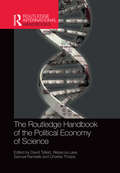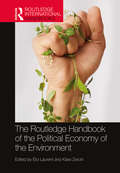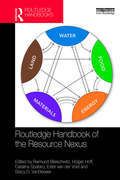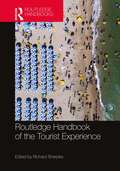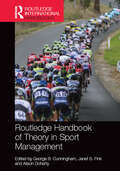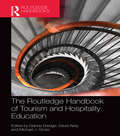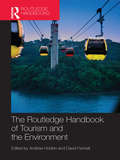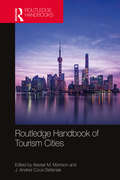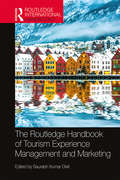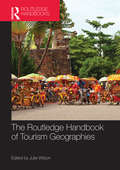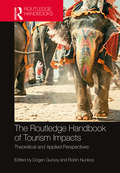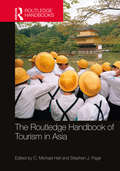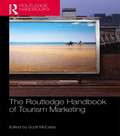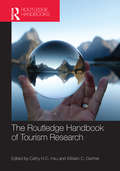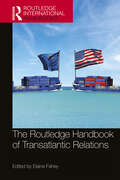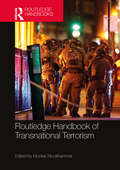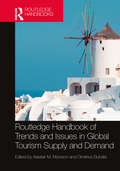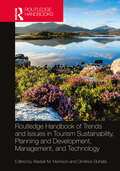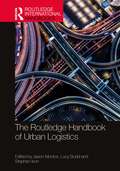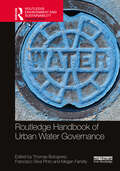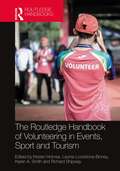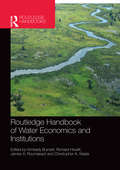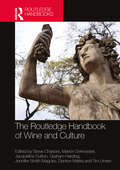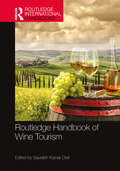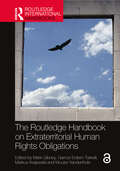- Table View
- List View
The Routledge Handbook of the Political Economy of Science (Routledge International Handbooks)
by David Tyfield Rebecca Lave Samuel Randalls Charles ThorpeThe political economy of research and innovation (R&I) is one of the central issues of the early twenty-first century. ‘Science’ and ‘innovation’ are increasingly tasked with driving and reshaping a troubled global economy while also tackling multiple, overlapping global challenges, such as climate change or food security, global pandemics or energy security. But responding to these demands is made more complicated because R&I themselves are changing. Today, new global patterns of R&I are transforming the very structures, institutions and processes of science and innovation, and with it their claims about desirable futures. Our understanding of R&I needs to change accordingly. Responding to this new urgency and uncertainty, this handbook presents a pioneering selection of the growing body of literature that has emerged in recent years at the intersection of science and technology studies and political economy. The central task for this research has been to expose important but consequential misconceptions about the political economy of R&I and to build more insightful approaches. This volume therefore explores the complex interrelations between R&I (both in general and in specific fields) and political economies across a number of key dimensions from health to environment, and universities to the military. The Routledge Handbook of the Political Economy of Science offers a unique collection of texts across a range of issues in this burgeoning and important field from a global selection of top scholars. The handbook is essential reading for students interested in the political economy of science, technology and innovation. It also presents succinct and insightful summaries of the state of the art for more advanced scholars.
The Routledge Handbook of the Political Economy of the Environment (Routledge International Handbooks)
by Éloi Laurent Klara ZwicklFeaturing a stellar international cast list of leading and cutting-edge scholars, The Routledge Handbook of the Political Economy of the Environment presents the state of the art of the discipline that considers ecological issues and crises from a political economy perspective. This collective volume sheds new light on the effect of economic and power inequality on environmental dynamics and, conversely, on the economic and social impact of environmental dynamics. The chapters gathered in this handbook make four original contributions to the field of political economy of the environment. First, they revisit essential concepts and methods of environmental economics in the light of their political economy. Second, they introduce readers to recent theoretical and empirical advances in key issues of political economy of the environment with a special focus on the relationship between inequality and environmental degradation, a nexus that has dramatically come into focus with the COVID crisis. Third, the authors of this handbook open the field to its critical global and regional dimensions: global issues, such as the environmental justice movement and inequality and climate change as well as regional issues such as agriculture systems, air pollution, natural resources appropriation and urban sustainability. Fourth and finally, the work shows how novel analysis can translate into new forms of public policy that require institutional reform and new policy tools. Ecosystems preservation, international climate negotiations and climate mitigation policies all have a strong distributional dimension that chapters point to. Pressing environmental policy such as carbon pricing and low-carbon and energy transitions entail numerous social issues that also need to be accounted for with new analytical and technological tools. This handbook will be an invaluable reference, research and teaching tool for anyone interested in political economy approaches to environmental issues and ecological crises.
Routledge Handbook of the Resource Nexus (Routledge Environment and Sustainability Handbooks)
by Raimund Bleischwitz Holger Hoff Catalina Spataru Ester Van Der Voet Stacy D. VanDeveerIn recent years the concept of the resource "nexus" has been both hotly debated and widely adopted in research and policy circles. It is a powerful new way to understand and better govern the myriad complex relationships between multiple resources, actors and their security concerns. Particular attention has been paid to water, energy and food interactions, but land and materials emerge as critical too. This comprehensive handbook presents a detailed review of current knowledge about resource nexus-related frameworks, methods and governance, including a broad set of inter-disciplinary perspectives. Written by an international group of scholars and practitioners, the volume focuses on rigorous research, including tools, methods and modelling approaches to analyse resource use patterns across societies and scales from a "nexus perspective". It also provides numerous examples from political economy to demonstrate how resource nexus frameworks can illuminate issues such as land grabs, mining, renewable energy and the growing importance of economies such as China, as well as to propose lessons and outlooks for sound governance. The volume seeks to serve as an essential reference text, source book and state-of-the-art, science-based assessment of this increasingly important topic – the resource nexus – and its utility in efforts to enhance sustainability of many kinds and implement the United Nations Sustainable Development Goals in an era of environmental and geopolitical change.
Routledge Handbook of the Tourist Experience
by Richard SharpleyRoutledge Handbook of the Tourist Experience offers a comprehensive synthesis of contemporary research on the tourist experience. It draws together multidisciplinary perspectives from leading tourism scholars to explore emergent tourist behaviours and motivations. This handbook provides up-to-date, critical discussions of established and emergent themes and issues related to the tourist experience from a primarily socio-cultural perspective. It opens with a detailed introduction which lays down the framework used to examine the dynamic parameters of the tourist experience. Organised into five thematic sections, chapters seek to build and enhance knowledge and understanding of the significance and meaning of diverse elements of the tourist experience. Section 1 conceptualises and understands the tourist experience through an exploration of conventional themes such as tourism as authentic and spiritual experience, as well as emerging themes such as tourism as an embodied experience. Section 2 investigates the new, developing tourist demands and motivations, and a growing interest in the travel career. Section 3 considers the significance, motives, practices and experiences of different types of tourists and their roles such as the tourist as photographer. Section 4 discusses the relevance of ‘place’ to the tourist experience by exploring the relationship between tourism and place. The last section, Section 5, scrutinises the role of the tourist in creating their experiences through themes such as ‘transformations in the tourist role’ from passive receiver of experiences to co-creator of experiences, and ‘external mediators in creating tourist experiences'. This handbook is the first to fill a notable gap in the tourism literature and collate within a single volume critical insights into the diverse elements of the tourist experience today. It will be of key interest to academics and students across the fields of tourism, hospitality management, geography, marketing and consumer behaviour.
Routledge Handbook of Theory in Sport Management (Routledge International Handbooks)
by George B. Cunningham Alison Doherty Janet S. FinkTheory is an essential element in the development of any academic discipline and sport management is no exception. This is the first book to trace the intellectual contours of theory in sport management, and to explain, critique and celebrate the importance of sport management theory in academic research, teaching and learning, and in the development of professional practice. Written by a world-class team of international sport management scholars, each of whom has taken a leading role in developing a particular theory or framework for understanding sport management, the book covers the full span of contemporary issues, debates, themes and functional approaches, from corporate social responsibility and diversity to strategy, marketing and finance. Every chapter explores a key theoretical approach, including an overview of that theory, a discussion of the process of theory development and of how the theory has been employed in research, practice or teaching, and outlines directions for future research in that area. Each chapter includes cases and examples, as well as short illustrative commentaries from people who have used that particular theory in their work, and attempts to highlight the theory-practice links, or gaps, in that area. For a fully-rounded understanding of what sport management is and how it should be studied, taught and practiced, a thorough grounding in theory is essential. The Routledge Handbook of Theory in Sport Management is therefore important reading for all advanced students, researchers, instructors, managers and practitioners working in this exciting field.
The Routledge Handbook of Tourism and Hospitality Education (F. Scott Fitzgerald Manuscripts)
by Dianne Dredge David Airey Michael J. GrossTourism is much more than an economic sector, it is also a social, cultural, political, and environmental force that drives societal change. Understanding, responding to, and managing this change will inevitably require knowledge workers who are able to address a range of problems associated with tourism, travel, hospitality, and the increasingly complex operating environment within which they exist.The purpose of this Handbook is to provide an insightful and authoritative account of the various issues that are shaping the higher educational world of tourism, hospitality and events education and to highlight the creative, inventive and innovative ways that educators are responding to these issues. It takes as its central focus a dynamic curriculum space shaped by internal and external factors from global to local scales, a variety of values and perspectives contributed by a range of stakeholders, and shifting philosophies about education policy, pedagogy and teaching practice. A benchmark for future curriculum design and development, it critically reviews the development of conceptual and theoretical approaches to tourism and hospitality education. The Handbook is composed of contributions from specialists in the field, is interdisciplinary in coverage and international in scope through its authorship and content.Providing a systematic guide to the current state of knowledge on tourism and hospitality education and its future direction this is essential reading for students, researchers and academics in Tourism, Hospitality, Events, Recreation and Leisure Studies.
The Routledge Handbook of Tourism and the Environment
by Andrew Holden David FennellThe Routledge Handbook of Tourism and the Environment explores and critically evaluates the debates and controversies inherent to tourism’s relationship with nature, especially pertinent at a time of major re-evaluation of our relationship with the environment as a consequence of the environmental problems we now face. It brings together leading specialists from range of disciplinary backgrounds and geographical regions, to provide state-of-the-art theoretical reflection and empirical research on this complex relationship and future direction. The book is divided in to five interrelated sections. Section one evaluates the philosophical basis, rationale and complexity of what is meant by the term ‘environment’ considering the major influences in the construction of how we understand our surroundings and the types of values we place upon them. Section two evaluates the types of eco-systems that are used as natural resources for tourism and the negative and positive impacts upon them. Section three evaluates relevant environmental policy and management mechanisms for the impacts of tourism on the natural environment. Section four focuses on the changing tourism-environment relationship, and the types of tourism that have become established in the tourism industry, market and policy. Section five, analyzes contemporary and future issues of the tourism-environment relationship, based upon themes of environmental and social welfare. This timely book will provide an invaluable resource for all those with an interest in tourism’s relationship with the natural environment, encouraging dialogue across disciplinary boundaries and areas of study. The book is international in its focus, emphasizing that issues of tourism and the natural environment are not only localized but transcend national boundaries that sometimes require both international and global responses. This is essential reading for student, researchers and academics of Tourism as well as those of Geography, Environmental Studies and Development Studies.
Routledge Handbook of Tourism Cities
by Alastair M. Morrison J. Andres Coca-StefaniakThe Routledge Handbook of Tourism Cities presents an up-to-date, critical and comprehensive overview of established and emerging themes in urban tourism and tourist cities. Offering socio-cultural perspectives and multidisciplinary insights from leading scholars, the book explores contemporary issues, challenges and trends. Organised into four parts, the handbook begins with an introductory section that explores contemporary issues, challenges and trends that tourism cities face today. A range of topics are explored, including sustainable urban tourism, overtourism and urbanisation, the impact of terrorism, visitor–host interactions, as well as reflections on present and future challenges for tourism cities. In Part II the marketing, branding and markets for tourism cities are considered, exploring topics such as destination marketing and branding, business travellers and exhibition hosting. This section combines academic scholarship with real-life practice and case studies from cities. Part III discusses product and technology developments for tourism cities, examining their supply and impact on different travellers, from open-air markets to creative waterfronts, from social media to smart cities. The final Part offers examples of how urban tourism is developing in different parts of the world and how worldwide tourism cities are adapting to the challenges ahead. It also explores emerging forms of specialist tourism, including geology and ecology-based tourism, socialist heritage and post-communist destination tourism. This handbook fills a notable gap by offering a critical and detailed understanding of the diverse elements of the tourist experience today. It contains useful suggestions for practitioners, as well as examples for theoretical frameworks to students in the fields of urban tourism and tourism cities. The handbook will be of interest to scholars and students working in urban tourism, heritage studies, human geography, urban studies and urban planning, sociology, psychology and business studies.
The Routledge Handbook of Tourism Experience Management and Marketing (Routledge International Handbooks)
by Saurabh Kumar DixitThe Routledge Handbook of Tourism Experience Management and Marketing offers a comprehensive and thorough inquiry into both customary and emergent issues of tourism experience and co-creation. Drawing together contributions from 83 authors from 28 countries with varied backgrounds and interdisciplinary interests, the handbook highlights multiple representations and interpretations of the theme. It also integrates a selection of illustrative global case studies to effectively present its chapter contents. Tourism experience drives the contemporary tourist’s behavior as they travel in pursuit of experiencing unique and unusual destinations and activities. Creating a memorable and enduring experience is therefore a prerequisite for the all tourism business organizations irrespective of the nature of their products or services. This handbook focuses on conceptualizing, designing, staging, managing and marketing paradigms of tourism experiences from both supply and demand perspectives. It sheds substantial light on the contemporary theories, practices and future developments in the arena of experiential tourism management and marketing. Encompassing the latest thinking and research themes, this will be an essential reference for upper-level students, researchers, academics and industry practitioners of hospitality as well as those of tourism, gastronomy, management, marketing, consumer behavior, cultural studies, development studies and international business, encouraging dialogue across disciplinary boundaries.
The Routledge Handbook of Tourism Geographies
by Julie WilsonGeographical analysis of tourism spaces and places is advancing fast. In terms of human geography, the various recent academic ‘turns’ have led to fresh examination of existing debates and have advanced new theoretical ideas in geography that are more salient than ever for tourism studies. The Routledge Handbook of Tourism Geographies seeks to examine such recent developments by providing a state-of-the-art review of the field, documenting advances in research and evaluating different perspectives, approaches, techniques and contexts. The Routledge Handbook of Tourism Geographies considers recent disciplinary developments (including post-disciplinarily) in geography in relation to the study of tourism. It also analyzes the fledging relationships of the new mobilities paradigm, critical tourism studies and cultural political economy to tourism spaces and places, as well as acknowledging a spatial turn in poststructuralist social sciences more generally. In addition, it evaluates how postcolonial, feminist, sensory, performative and queer perspectives have diversified research in the tourism geographies field. Spatial analysis, time geography, placemaking and landscape concerns are addressed and issues such as transport, environmental discourses and development are also analyzed. Finally, the volume’s contributions highlight key areas for advancing research and map out the dimensions of future trajectories in tourism geographies in different theoretical and thematic contexts. Written by leading scholars in the tourism geographies field, this text will provide an invaluable resource for all those with an interest in tourism geographies, encouraging dialogue across disciplinary boundaries and areas of study.
The Routledge Handbook of Tourism Impacts: Theoretical and Applied Perspectives
by Dogan Gursoy Robin NunkooThis handbook explores and critically examines both positive and negative impacts of tourism development focusing on the past, present and future issues, challenges and trends from a multidisciplinary global perspective. Through a comparative approach involving international case studies, this book explores our understanding of tourism impacts and contributes to the theoretical development on relationships between tourism impacts and community support for tourism development. This handbook focuses on a variety of geographical locations, drawing from the knowledge and expertise of highly regarded academics from around the world. Specifically, it explores the adoption and implementation of various tourism development and impact management approaches in a wide range of global contexts, while identifying their trends, issues and challenges. It addresses strategies relating to innovation, sustainability and social responsibility, and critically reviews the economic, sociocultural, environmental, political and technological impacts of tourism. The text also identifies future trends and issues, as well as exploring the methods used to study tourism impacts. Conveying the latest thinking and research, this handbook will be a key reference for students, researchers and academics of tourism, as well as development studies, geography, cultural studies, sustainability and business, encouraging dialogue across disciplinary boundaries and areas of study.
The Routledge Handbook of Tourism in Asia
by C. Michael Hall Stephen J. PageAsia is regarded as the fastest growing area for international and domestic tourism in the world today and over the next 20 years. Given the economic, social and environmental importance of tourism in the region, there is a need for a comprehensive and readable overview of the critical debates and controversies in tourism in the region and the major factors that are affecting tourism development both now and in the foreseeable future. This Handbook provides a contemporary survey of the region and its continued growth and development as a key destination and generator of tourism, which is marked by a high proportion of intra-regional travel. The book is divided into five sections. This first section provides an introduction to the region and context to the nationally focused chapters. The next three sections are then broadly based on the three UNWTO Asian regions: South-East Asia, South and Central Asia, and East and North-East Asia, providing readers with a valuable snapshot of tourism at various scales, and from various approaches and positions. The concluding section considers future prospects for tourism in Asia. The handbook is interdisciplinary in coverage and is also international in scope through its authorship and content. It presents a range of perspectives and understanding of the processes and forces that are shaping tourism in this fascinating and dynamic region that is one of the focal points of global tourism. This is essential reading for students, researchers and academics interested in tourism in the growth region of Asia now and in the future.
The Routledge Handbook of Tourism Marketing
by Scott McCabeTourism has often been described as being about ‘selling dreams’, tourist experiences being conceptualized as purely a marketing confection, a socially constructed need. However, the reality is that travel for leisure, business, meetings, sports or visiting loved ones has grown to be a very real sector of the global economy, requiring sophisticated business and marketing practices. The Routledge Handbook of Tourism Marketing explores and critically evaluates the current debates and controversies inherent to the theoretical, methodological and practical processes of marketing within this complex and multi-sector industry. It brings together leading specialists from range of disciplinary backgrounds and geographical regions to provide reflection and empirical research on this complex relationship. The Handbook is divided in to nine inter-related sections: Part 1 deals with shifts in the context of marketing practice and our understanding of what constitutes value for tourists; Part 2 explores macromarketing and tourism; Part 3 deals with strategic issues; Part 4 addresses recent advances in research; Part 5 focuses on developments in tourist consumer behaviour; Part 6 looks at micromarketing; Part 7 moves on to destination marketing and branding issues; Part 8 looks at the influence of technological change on tourism marketing; and Part 9 explores future directions. This timely book offers the reader a comprehensive synthesis of this sub-discipline, conveying the latest thinking and research. It will provide an invaluable resource for all those with an interest in tourism and marketing, encouraging dialogue across disciplinary boundaries and areas of study. This is essential reading for Tourism students, researchers and academics as well as those of Marketing, Business, Events Management and Hospitality Management.
The Routledge Handbook of Tourism Research
by Cathy H. C. Hsu William C. GartnerThe Routledge Handbook of Tourism Research is a compendium of some of the most relevant issues affecting tourism development today. The topics addressed in this book provide some new thinking for those involved in tourism research. This book takes the reader from the beginnings of tourism research to a discussion of emerging forms of tourism and selected examples of tourism development. The underlying theoretical dimensions are reviewed, analysed and discussed from a number of perspectives. This book brings together leading researchers, many of whom are members of the International Academy for the Study of Tourism, to discuss tourism today and its future. The works included in this volume are diverse, in terms of geographical context, research methodology, root discipline, and perspective. This book represents studies based in Europe, North America, Oceania, and Asia. Research methodologies include both quantitative and qualitative. Both macro and micro issues are discussed from the economic, psychological, sociological, political science, marketing, and other perspectives, which reflect the interdisciplinary nature of tourism studies. This book is divided into 6 sections. Section 1 considers the foundations for tourism research. Section 2 discusses the implications for destination management and section 3 discusses planning for tourism development. Section 4 covers human capital for tourism development. And finally, section 5 evaluates emerging forms of tourism and then section 6 offers insights into tourism evolution. It offers the reader a comprehensive synthesis of this field, conveying the latest thinking and research. The text will provide an invaluable resource for all those with an interest in tourism research. This is essential reading for students, researchers & academics of Tourism as well as those of related studies in particular Leisure, Hospitality & Development Studies.
The Routledge Handbook of Transatlantic Relations (Routledge International Handbooks)
by Elaine FaheyThe Routledge Handbook on Transatlantic Relations is an essential and comprehensive reference for the regulation of transatlantic relations across a range of subjects, bringing together contributions from scholars, policy makers, lawyers and political scientists. Future oriented in a range of fields, it probes the key technical, procedural and policy issues for the US of dealing with, negotiating, engaging and law-making with the EU, taking a broad interdisciplinary perspective including international relations, politics, political economic and law, EU external relations law and international law and assesses the external consequences of transatlantic relations in a systematic and comprehensive fashion. The transatlantic relationship constitutes one of the most established and far-reaching democratic alliances globally, and which has propelled multilateralism, trade regulation and the EU-US relationship in global challenges. The different contributions will propose solutions to overcome these problems and help us understand the shifting transatlantic agenda in diverse areas from human rights, to trade, and security, and the capacity of the transatlantic relationship to set new international agendas, standards and rules. The Routledge Handbook on Transatlantic Relations will be a key reference for scholars, students and practitioners of Transatlantic Relations/EU-US relations, EU External Relations law, EU rule-making, EU Security law and more broadly to global governance, International law, international political economy and international relations.
Routledge Handbook of Transnational Terrorism
by Nicolas StockhammerThis handbook provides contributions by some of the world-leading experts in the field on recent phenomena and trends in transnational terrorism. Based on the methodological approach of a trend-and-key factor analysis of transnational terrorism and processed on the virtual platform "Foresight Strategy Cockpit" (FSC), the volume seeks to examine what potential future variants of transnational terrorism may evolve. Focusing on the latest structural developments in the sphere of politically or religiously motivated violence, the handbook considers the tactical, strategic, and not least the systemic dimension of terrorism. Divided into seven thematic sections, the handbook’s contributions cover a wide range of issues, dealing among others with strategic and hybrid terrorism, the systemic dimension of extremist violence, prevalent actors, counter-narratives, the crime terror-nexus, the role of digitalization and the spiral dynamic between Islamist and right-wing terrorism. The expert contributions provide a condensed overview of current developments, structural linkages and important academic debates centering around transnational salafi-jihadi terrorism, but also right-wing terrorism and counter-terrorism. A key objective of the work is to make the effects of prevention/preemption, (de-) radicalization and (non-) intervention both transparent and assessable. As such, it contributes well-founded strategies, feasible solutions and options for policy-makers and counter-terrorism experts. This volume will be of great interest to students of terrorism and counter-terrorism, political violence and security studies.
Routledge Handbook of Trends and Issues in Global Tourism Supply and Demand
by Alastair M. Morrison Dimitrios BuhalisThis Handbook provides a comprehensive overview of trends and issues in the global supply and demand on tourism. With contributions from 70 authors, this Handbook showcases a diverse range of perspectives with insights from around the globe. It reviews the interactions among trends and issues, and it emphasises the importance of tracking and interpreting these on a global scale. The book is organized into three parts, with Part I focusing on supply-side trends including transport, attractions, culture, heritage tourism, technology, policies, and destination management. Part II critically reviews the external factor trends, including the impact of terrorism, multi-crisis destinations, Generation Z’s important contributions to the sector, the regulation of sharing economy platforms and nature tourism in future. Part III focuses on market-led trends such as bleisure, glamping, VFR travel, transformational tourism and new trends in wellness tourism following the post-COVID era. The book also provides predictions for the upcoming decades. This Handbook will be a vital tool for researchers, students, and practitioners in the tourism and hospitality sector to further develop their knowledge and expertise in the field. It examines business and policy implications, offering guidance for developing sustainable competitive advantage.
Routledge Handbook of Trends and Issues in Tourism Sustainability, Planning and Development, Management, and Technology
by Alastair M. Morrison Dimitrios BuhalisThe Handbook offers a comprehensive overview of theoretical and practical perspectives for tracking and interpreting trends and issues in tourism sustainability, planning and development, management, and technology. Tourism is a dynamic and unpredictable industry and understanding its trends and issues is critical for the successful and sustainable development of the private and public sector. As such, this Handbook proposes clear definitions and provides a systematic classification scheme for such analysing. It reviews trends and issues in four thematic areas of tourism: sustainability; planning and development; management and technology with contributions from 83 leading tourism scholars from across the globe. The Handbook provides insights on the differences among domestic, outbound, and inbound markets and acknowledges that the supply sub-sectors of tourism are diverse, highlighting variations by geographic regions. The book emphasises the necessity to prioritise sustainability and the achievement of the UN's Sustainable Development Goals (SDGs). Students and professionals interested in tourism, hospitality, and sustainability will find a wealth of multidisciplinary knowledge in this Handbook.
The Routledge Handbook of Urban Logistics (Routledge International Handbooks)
by Jason Monios Lucy Budd Stephen IsonThe Routledge Handbook of Urban Logistics offers a state-of-the-art, comprehensive overview of the discipline of urban and city logistics. The COVID-19 pandemic and the rise in internet shopping in particular have placed new demands on urban logistics which require innovative technological and policy responses. Similarly, the necessity for sustainable urban logistics offers both a challenge and opportunity for development and seeks to address traffic congestion, local air quality, traffic-related degradation, the use of energy, safety aspects and noise. Featuring contributions from world-leading, international scholars, the chapters examine concepts, issues and ideas across five topic areas that reflect the increasingly diverse nature of current research and thinking in urban logistics: transport modes, urban logistics sectors, technical analysis, policy, and sustainability. Each chapter provides an overview of current knowledge, identifies issues and discusses the relevant debates in urban logistics and the future research agenda. This handbook offers a single repository on the current state of knowledge, written from a practical perspective, utilising theory that is applied and developed using real-work examples. It is an essential reference for researchers, academics and students working in all areas of urban logistics, from policy and planning to technology and sustainability, in addition to industry practitioners looking to develop their professional knowledge.
Routledge Handbook of Urban Water Governance (Routledge Environment and Sustainability Handbooks)
by Thomas Bolognesi, Francisco Silva Pinto and Megan FarrellyThis handbook provides a comprehensive, state-of-the-art overview of urban water governance. Of the many growing challenges presented by rapid urbanization, water governance is a critical one and while urban water governance is now regarded as a critical field of research, the literature is fragmented. For the first time, this handbook brings together urban water governance research, containing interdisciplinary contributions from established and emerging scholars, practitioners, and policymakers. It addresses the key questions of how urban water governance works, how is it shaped, and what the impacts are. The handbook's structure offers a progressive entry into the complexity of urban water governance. Starting with technical dimensions, the handbook addresses supply and demand, wastewater, and sanitation. It then considers regulation and economic factors, examining water utilities and services. Political processes, and the actors involved, are addressed and the handbook finishes with a part focusing on governance and sustainability, where chapters address critically important topics such as access to water, water safety, and water security. This handbook is essential reading for students, scholars, and professionals interested in urban water governance, urban studies, and water resource management and sustainability more broadly.
The Routledge Handbook of Volunteering in Events, Sport and Tourism
by Kirsten HolmesThis timely handbook examines the most contemporary, controversial and cutting-edge issues related to the involvement of volunteers in the fields of events, sport and tourism. Split into thematic sections, the primary areas covered include: key disciplinary approaches to understanding volunteerism, international contexts, managing volunteers, the impacts and legacies of volunteering and future trends in these sectors including online and digital volunteering. Commonalities and differences of volunteering in these sectors are drawn out throughout the volume. A diverse range of case studies are examined including the 2007 UEFA Under 21 Championship hosted by Poland, the development of the Appalachian National Scenic Trail, the Vancouver, London and Pyeong Chang Olympic Games, Belgium’s National Day in 2019, the Puffing Billy railway in Australia, as well as many other examples looking at destination services organizations, museums, grassroots associations, corporate events, community events and visitor attractions. Drawing on the academic and practical expertise of over 50 authors from across the globe, the handbook provides an invaluable resource for all those with an interest in volunteering in these sectors, encouraging dialogue across disciplinary boundaries and areas of study in order to advance volunteering research and practice in the fields of events, sport and tourism.
Routledge Handbook of Water Economics and Institutions (Routledge Environment and Sustainability Handbooks)
by Kimberly Burnett Richard Howitt James A. Roumasset Christopher A. WadaGrowing scarcity of freshwater worldwide brings to light the need for sound water resource modeling and policy analysis. While a solid foundation has been established for many specific water management problems, combining those methods and principles in a unified framework remains an ongoing challenge. This Handbook aims to expand the scope of efficient water use to include allocation of sources and quantities across uses and time, as well as integrating demand-management with supply-side substitutes. Socially efficient water use does not generally coincide with private decisions in the real world, however. Examples of mechanisms designed to incentivize efficient behavior are drawn from agricultural water use, municipal water regulation, and externalities linked to water resources. Water management is further complicated when information is costly and/or imperfect. Standard optimization frameworks are extended to allow for coordination costs, games and cooperation, and risk allocation. When operating efficiently, water markets are often viewed as a desirable means of allocation because a market price incentivizes users to move resources from low to high value activities. However, early attempts at water trading have run into many obstacles. Case studies from the United States, Australia, Europe, and Canada highlight the successes and remaining challenges of establishing efficient water markets.
The Routledge Handbook of Wine and Culture
by Steve Charters Marion Demossier Jacqueline Dutton Graham Harding Jennifer Smith Maguire Denton Marks Tim UnwinThe link between culture and wine reaches back into the earliest history of humanity. The Routledge Handbook of Wine and Culture brings together a newly comprehensive, interdisciplinary overview of contemporary research and thinking on how wine fits into the cultural frameworks of production, intermediation and consumption. Bringing together many leading researchers engaged in studying these phenomena, it explores the different ways in which wine is constructed as a social artefact and how its representation and use acquire symbolic meaning. Wine can be analysed in different ways by varying disciplines involved in exploring wine and culture (anthropology, economics and business, geography, history and sociology, and as text). The Handbook uses these as lenses to consider how producers, intermediaries and consumers use and create cultural significance. Specifically, the work addresses the following: how wine relates to place, belief systems and accompanying rituals; how it may be used as a marker of the identity and mechanisms of civilising processes (often in conjunction with food and the arts); how its framing intersects with science and nature; the ideologies and power relations which arise around all these activities; and the relation of this to wine markets and public institutions. This is essential reading for researchers and students in education for the wine industry and in the humanities and social sciences engaged in understanding patterns of human ingenuity and interaction, such as sociology, anthropology, health, geography, business, tourism, cultural studies, food studies and history.
Routledge Handbook of Wine Tourism
by Saurabh Kumar DixitWine tourism or enotourism or oenotourism or winery tourism or vinitourism is a special interest tourism that empowers local culture and spawns business opportunities for the local community. The comprehensive Routledge Handbook of Wine Tourism offers a thorough inquiry into both regular and emerging issues of wine tourism. Modern wine tourism extends beyond the mere cultivation of grapes and the production and selling of wine. The Routledge Handbook of Wine Tourism examines the complex interplay of market profiling, sustainable regional development, and innovative experiential marketing constructs which, when successful, contribute to the growth and sustainable evolution of global wine tourism. This handbook examines how the success of various enotourism events such as vineyard visits, winery tours, wine festivals and wine trails can stimulate the development of wine-producing regions and territories. Incorporating the latest philosophies and research themes, this handbook will be an essential reference for students, researchers, academics and industry practitioners of hospitality and tourism, gastronomy, management, marketing, cultural studies, development studies, international business and for encouraging dialogue across disciplinary boundaries.
The Routledge Handbook on Extraterritorial Human Rights Obligations (Routledge International Handbooks)
by Mark Gibney Gamze Erdem Türkelli Markus Krajewski Wouter VandenholeThe Routledge Handbook on Extraterritorial Human Rights Obligations brings international scholarship on transnational human rights obligations into a comprehensive and wide-ranging volume. Each chapter combines a thorough analysis of a particular issue area and provides a forward-looking perspective of how extraterritorial human rights obligations (ETOs) might come to be more fully recognized, outlining shortcomings but also best state practices. It builds insights gained from state practice to identify gaps in the literature and points to future avenues of inquiry. The Handbook is organized into seven thematic parts: conceptualization and theoretical foundations; enforcement; migration and refugee protection; financial assistance and sanctions; finance, investment and trade; peace and security; and environment. Chapters summarize the cutting edge of current knowledge on key topics as leading experts critically reflect on ETOs, and, where appropriate, engage with the Maastricht Principles to critically evaluate their value 10 years after their adoption. The Routledge Handbook on Extraterritorial Human Rights Obligations is an authoritative and essential reference text for scholars and students of human rights and human rights law, and more broadly, of international law and international relations as well as to those working in international economic law, development studies, peace and conflict studies, environmental law and migration.
